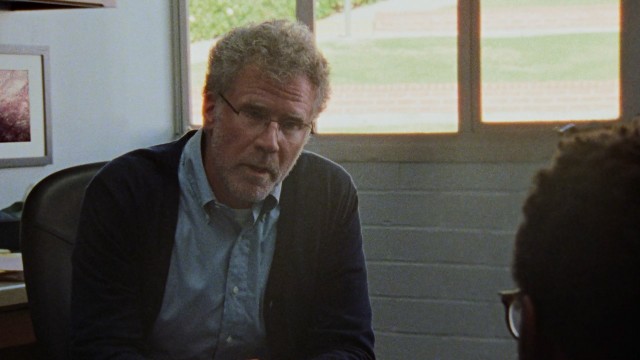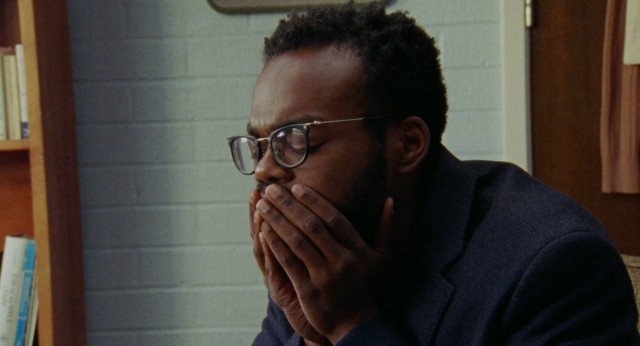With his directorial debut David, Zach Woods (Silicon Valley, The Office) teams up with Will Ferrell to tell the tale of a therapist who has to confront the bundled up frustrations of his son (Fred Hechinger) during a session with a possibly suicidal patient (William Jackson Harper). What unfolds is a comedy that attains its uneasy laughs and particular tone from taking its odd premise seriously and seeing how these three people would react in a situation like that.
Starting innocently enough, with a conventional patient/doctor therapy session, David takes a tonal shift when a young man, dressed in a shining red wrestling uniform, appears framed in the window, running towards the office. Banging on the glass and disturbing the peaceful setting required for therapy, we soon learn that this is the therapist’s son, demanding his father’s attention. On the day of his biggest wrestling match, all he wants is to see his dad cheering him on from the stands, which would be understandable behavior if he wasn’t so oblivious to what was happening around him and the chaos he has now provoked through his actions.
As things quickly escalate, words are exchanged and things are said, which might never be able to be taken back. Though David is full of humor, it’s fascinating to watch how Woods manages to come out of this absurd scenario with an emotional catharsis for all three of his characters. It’s a deeply felt climax that is neither forced nor unearned.

Will Ferrell as the unnamed therapist in Zach Woods’ David
When we talk about David, we definitely need to consider the effect it has when filmmakers cast famous actors in their short films. First off, this is mostly a matter of access. Sure, if your script is exceptional or you have some other convincing hook as a filmmaker, there might be a chance that even an unknown independent filmmaker can find a way to cast well-known thespians in their short.
With Woods a recognizable actor himself, we must assume he was able to rely on his connections within the Hollywood system to not only cast a heavy-weight comedian like Ferrell (the pair shared screen time in The Office and recent Force Majeure remake Downhill), but also subsequently distribute the short through Conan O’Brien’s Team Coco network. Very few aspiring filmmakers have these kinds of resources available and it is important to acknowledge that Woods most probably benefited from his successful career in front of the camera to attract such a cast for his directorial debut.
The presence of Ferrell in David not only guarantees interest in the film, through sheer star power alone, but the actor’s presence and well-known comedic brand undoubtedly adds to the viewing experience and the character’s inherent design, which the film is built on. One might wonder if the short would be as effective without a big star in the lead role, but this is beside the point, as it is Ferrell playing the therapist and he doesn’t hold back.
The actor has become synonymous with conveying awkward, repressed temper and watching David you find yourself constantly expecting his therapist protagonist to flip-out at any second, in his trademark style. If on the other hand he stays serious, we might perceive it as him playing against type, like he did in Everything Must Go or Stranger than Fiction. In both instances, the viewer’s perception and expectation add to the film’s experience, even before we know what is really going on.

William Jackson Harper as David, a patient in need of his therapist’s help.
In the case of David, Ferrell is able to rely on his two co-stars William Jackson Harper (The Good Place) and Fred Hechinger (The White Lotus) to create the short’s uncomfortable humor and tension. While Harper contributes the necessary neutral center, as a depressed patient who feels rightly out of place, it is Hechinger’s desperate attempts for his father’s attention that provide the necessary conflict here. Perfectly capturing the strain in the father/son relationship, he explodes onto the scene, portraying an inept anger that could have easily been portrayed by a younger Will Ferrell, making the casting even more intriguing.
All that being said, we wouldn’t feature a film just because of its big-name cast if it didn’t meet our curatorial standards. It takes a lot of talent to craft a script (co-written by Brandon Gardner) for a dramedy that basically consists of one long scene (with a prolog and an epilog) and still works this well in establishing character, humor and emotional conflict. Woods’ direction, in combination with the somber tone of the cinematography, lends a sensitive and calm atmosphere to the situation, enabling the comedy to unfold, while still upholding the humane nature of a story orbiting around the hurt that comes from a dysfunctional relationship between a father and son.
With Wood’s second film as director, Bud, recently released on Vimeo, it will be interesting to see how his filmmaking career evolves in the future, but from watching his short films and as a fan of his character, Jared Dunn on Silicon Valley, I can’t help but end this review with a quote from the show: “This guy f*cks.” (Sorry)

 Georg Csarmann
Georg Csarmann